Pembroke Sinclair's Blog, page 15
January 16, 2018
The Story Behind the Audiobook
It’s finally time to tell you the story behind the audiobook for
Life After the Undead
. I wanted to wait until it was available so I didn’t jinx it.
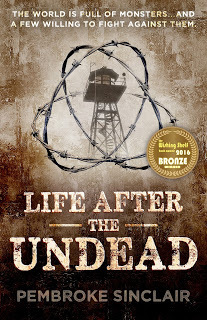
I had been contemplating for a while that I should make my books available as audiobooks, but I wasn’t exactly sure about the process. Plus, I had to decide which book I wanted to do first and how I wanted to do it.
As with most things in publishing, there are a lot of options out there for turning your book into an audiobook . Deciding on a platform means you have to decide how much you can and are willing to pay for the audiobook’s creation. Then, you have to decide if you’re going to do the narration yourself or if someone is going to narrate it for you.
I had a friend who had used ACX a while ago, so I decided to check out that site. It wasn’t the only one I checked out, there were several others I looked into. They all had their pros and cons, including price.
At first, I figured that I would do the narration myself. I have a sound mixer on my computer, and I figured it couldn’t be that hard, so I started recording a few chapters. It didn’t take long for me to realize this probably wasn’t the best route to take for my book.
Like most people, hearing the sound of my own voice makes me cringe. Plus, my equipment isn’t exactly professional, and I was sure that would come across in the recording. I wanted to give my audiobook the best chance to be successful, and I figured narrating it myself would set it up for failure. Thus, I decided to find a narrator.
Since I didn’t have a lot of funds to work with, I decided to use ACX as my audiobook platform. It gave me the option of choosing a range of prices per recorded hour or doing a royalty share with the narrator. It cautioned that if I chose the royalty share option, there was a chance my book wouldn’t be picked up by a narrator. I’ve also worked for royalty shares in the past, so I know that it isn’t as beneficial as it sounds. I wanted my narrator to be compensated upfront for their hard work—even if it wasn’t a ton.
I found an investor (hi, Mom! [Don’t judge. It’s nice to have support for my writing]) who was kind enough to help me with my dream of developing an audiobook. I then decided to develop Life After the Undead because it’s my bestselling book. I figured I needed to put the book with the best chance of making sales out there.
When you upload the book’s information onto the ACX site, you have a variety of options to choose from. You can pick if you want a male or female narrator, how old you want them to sound, and what type of attitude they’ll bring to the reading. You can even specify accents. It’s pretty involved.
From there, you upload a sample from your work that will be used as the audition. It doesn’t have to be long, but enough to get an idea of how the narrator will sound reading your book. Then, you wait for the auditions to roll in.
I started the audiobook process for Life over the summer—I want to say at the end of July. By August, I had my first audition. Narrators weren’t beating down my door to read the story, and this one had a nice voice and read well, so I decided to go for it.
The nice thing about ACX is that they have a contract system built in. You decide when the first 15 minutes need to be uploaded, and then when the rest of the book needs to be completed. Since you choose the range of what you want to pay per recorded hour, you can negotiate payment, but I just went with the top of the scale—I felt it was fair compensation. ACX then sends the contract to the narrator to sign.
All in all, it was an incredibly simple process. The narrator then sends you the first 15 minutes, which you approve or send back with notes, then they work on the rest of the recording. On average, it takes about 1 to 2 months to complete a recording (depending on how long your story is), so I gave the narrator 6 weeks to get the final recording back to me.
Through the entire process, you have the ability to talk to the narrator through ACX’s internal messaging system. I didn’t want to bug the narrator while she was recording, so I limited the amount of messages I sent. I was so excited to hear the final version, though. I couldn’t wait.
The deadline came and went, and only a few chapters had been uploaded to the site. I messaged the narrator to see if she needed anything from me to finish the project, and I didn’t hear anything back. I let a few days pass, then I messaged again. Still nothing.
In the contract, there is a clause of what to do when something like this happens, so I contacted support. They had me send another message with a specific date of when I needed a reply from the narrator. If I didn’t get it, I was supposed to let them know, and they would send a message from their end.
I sent my message and waited, but still nothing. I let support know, and they sent their message. I was supposed to wait a week, then contact them again if I still heard nothing. I did, and they told me to wait another week. I did. I emailed them again, and they told me to wait another week.
At this point, I was incredibly frustrated. It was apparent that the narrator wasn’t going to respond to any messages, so why did I have to keep waiting? I wanted to get my project back out there for another narrator to pick up. I sent another email to support, worded very nicely, that conveyed my frustrations. They emailed back and said that the contract should have been terminated weeks ago. They took care of that, and the project was back on the boards for another narrator.
During the entire process, I was looking into other recording platforms. I felt that I didn’t want the frustration and hassle of dealing with ACX, but I didn’t have the funds to go with some of the other places. I decided ACX would get another chance.
And that’s when Cheyenne walked into my life—or rather spoke into my life.
Hearing her voice read the audition sample gave me goosebumps. It was perfect! I didn’t hesitate sending her the contract. She was excited and eager to get started. Again, I gave her a little over a month to finish the recording, then I gave her time and space to complete her task.
I’m not going to lie: there were numerous times during the project that I thought I was going to get burned again. Cheyenne and I talked more than the other narrator and I talked, so I had a better idea where she was in the process, but every so often, days would go by and I wouldn’t hear anything. I tried not to panic, but I was gun shy. Ask my book manager (hi, Pam!); she’ll tell you about the emails I sent trying not to freak out and only barely succeeding.
The final recordings were due at the end of November, but a delay caused them to be late. I tried not to panic, and told myself that the book would get done, but there was anxiety. I told myself that if I got burned again, having an audiobook wasn’t meant to be.
The chapters were all eventually uploaded and approved by me, then they were sent to ACX for their approval. There were some issues with the decibel levels, which made me think for sure that the book wasn’t going to get published, but Cheyenne was able to figure out the issue and get the new chapters uploaded.
Now, this whole process is history since the book is available on Audible and iTunes . Like everything in publishing, you have to be patient and flexible when having an audiobook made. The road had some bumps and unexpected twists, but in the end, everything worked out.
Since I want to remain consistent, Cheyenne has agreed to narrate the second book in the series, and work will start on that at the end of the month. We’re both convinced that the process will go more smoothly since the first book was a learning process for both of us.
I can’t wait for the second book to be done. Cheyenne does such an amazing job and brings Krista to life in a way I never imagined. It’s weird and amazing to hear the words I wrote coming out of someone else’s mouth, and I’m hooked on turning all my stories into audiobooks. I just have to find the funds…

I had been contemplating for a while that I should make my books available as audiobooks, but I wasn’t exactly sure about the process. Plus, I had to decide which book I wanted to do first and how I wanted to do it.
As with most things in publishing, there are a lot of options out there for turning your book into an audiobook . Deciding on a platform means you have to decide how much you can and are willing to pay for the audiobook’s creation. Then, you have to decide if you’re going to do the narration yourself or if someone is going to narrate it for you.
I had a friend who had used ACX a while ago, so I decided to check out that site. It wasn’t the only one I checked out, there were several others I looked into. They all had their pros and cons, including price.
At first, I figured that I would do the narration myself. I have a sound mixer on my computer, and I figured it couldn’t be that hard, so I started recording a few chapters. It didn’t take long for me to realize this probably wasn’t the best route to take for my book.
Like most people, hearing the sound of my own voice makes me cringe. Plus, my equipment isn’t exactly professional, and I was sure that would come across in the recording. I wanted to give my audiobook the best chance to be successful, and I figured narrating it myself would set it up for failure. Thus, I decided to find a narrator.
Since I didn’t have a lot of funds to work with, I decided to use ACX as my audiobook platform. It gave me the option of choosing a range of prices per recorded hour or doing a royalty share with the narrator. It cautioned that if I chose the royalty share option, there was a chance my book wouldn’t be picked up by a narrator. I’ve also worked for royalty shares in the past, so I know that it isn’t as beneficial as it sounds. I wanted my narrator to be compensated upfront for their hard work—even if it wasn’t a ton.
I found an investor (hi, Mom! [Don’t judge. It’s nice to have support for my writing]) who was kind enough to help me with my dream of developing an audiobook. I then decided to develop Life After the Undead because it’s my bestselling book. I figured I needed to put the book with the best chance of making sales out there.
When you upload the book’s information onto the ACX site, you have a variety of options to choose from. You can pick if you want a male or female narrator, how old you want them to sound, and what type of attitude they’ll bring to the reading. You can even specify accents. It’s pretty involved.
From there, you upload a sample from your work that will be used as the audition. It doesn’t have to be long, but enough to get an idea of how the narrator will sound reading your book. Then, you wait for the auditions to roll in.
I started the audiobook process for Life over the summer—I want to say at the end of July. By August, I had my first audition. Narrators weren’t beating down my door to read the story, and this one had a nice voice and read well, so I decided to go for it.
The nice thing about ACX is that they have a contract system built in. You decide when the first 15 minutes need to be uploaded, and then when the rest of the book needs to be completed. Since you choose the range of what you want to pay per recorded hour, you can negotiate payment, but I just went with the top of the scale—I felt it was fair compensation. ACX then sends the contract to the narrator to sign.
All in all, it was an incredibly simple process. The narrator then sends you the first 15 minutes, which you approve or send back with notes, then they work on the rest of the recording. On average, it takes about 1 to 2 months to complete a recording (depending on how long your story is), so I gave the narrator 6 weeks to get the final recording back to me.
Through the entire process, you have the ability to talk to the narrator through ACX’s internal messaging system. I didn’t want to bug the narrator while she was recording, so I limited the amount of messages I sent. I was so excited to hear the final version, though. I couldn’t wait.
The deadline came and went, and only a few chapters had been uploaded to the site. I messaged the narrator to see if she needed anything from me to finish the project, and I didn’t hear anything back. I let a few days pass, then I messaged again. Still nothing.
In the contract, there is a clause of what to do when something like this happens, so I contacted support. They had me send another message with a specific date of when I needed a reply from the narrator. If I didn’t get it, I was supposed to let them know, and they would send a message from their end.
I sent my message and waited, but still nothing. I let support know, and they sent their message. I was supposed to wait a week, then contact them again if I still heard nothing. I did, and they told me to wait another week. I did. I emailed them again, and they told me to wait another week.
At this point, I was incredibly frustrated. It was apparent that the narrator wasn’t going to respond to any messages, so why did I have to keep waiting? I wanted to get my project back out there for another narrator to pick up. I sent another email to support, worded very nicely, that conveyed my frustrations. They emailed back and said that the contract should have been terminated weeks ago. They took care of that, and the project was back on the boards for another narrator.
During the entire process, I was looking into other recording platforms. I felt that I didn’t want the frustration and hassle of dealing with ACX, but I didn’t have the funds to go with some of the other places. I decided ACX would get another chance.
And that’s when Cheyenne walked into my life—or rather spoke into my life.
Hearing her voice read the audition sample gave me goosebumps. It was perfect! I didn’t hesitate sending her the contract. She was excited and eager to get started. Again, I gave her a little over a month to finish the recording, then I gave her time and space to complete her task.
I’m not going to lie: there were numerous times during the project that I thought I was going to get burned again. Cheyenne and I talked more than the other narrator and I talked, so I had a better idea where she was in the process, but every so often, days would go by and I wouldn’t hear anything. I tried not to panic, but I was gun shy. Ask my book manager (hi, Pam!); she’ll tell you about the emails I sent trying not to freak out and only barely succeeding.
The final recordings were due at the end of November, but a delay caused them to be late. I tried not to panic, and told myself that the book would get done, but there was anxiety. I told myself that if I got burned again, having an audiobook wasn’t meant to be.
The chapters were all eventually uploaded and approved by me, then they were sent to ACX for their approval. There were some issues with the decibel levels, which made me think for sure that the book wasn’t going to get published, but Cheyenne was able to figure out the issue and get the new chapters uploaded.
Now, this whole process is history since the book is available on Audible and iTunes . Like everything in publishing, you have to be patient and flexible when having an audiobook made. The road had some bumps and unexpected twists, but in the end, everything worked out.
Since I want to remain consistent, Cheyenne has agreed to narrate the second book in the series, and work will start on that at the end of the month. We’re both convinced that the process will go more smoothly since the first book was a learning process for both of us.
I can’t wait for the second book to be done. Cheyenne does such an amazing job and brings Krista to life in a way I never imagined. It’s weird and amazing to hear the words I wrote coming out of someone else’s mouth, and I’m hooked on turning all my stories into audiobooks. I just have to find the funds…
Published on January 16, 2018 22:00
January 14, 2018
Apocalypse Preparedness
Dreams are strange beasts. Every action and detail make perfect sense while you’re asleep, and your mind projects a vivid picture of a world you’ve never known but feel like you know. When you wake up, if you remember your dream, you might think: What the hell was that?
I’m one of those people who remembers my dreams more often than not. I’m also a lucid dreamer , which means if something happens in my dream that I don’t like, I can change it without interrupting the flow of sleep or the dream. I’ve gotten several story ideas from my dreams.
For the last couple of weeks, I’ve been sick. That means that I’ve been sleeping more and taking medication to feel better, all of which have had an impact on my dreams. One night in particular, I had a crazy dream about the zombie apocalypse,
Now, it’s not odd for me to dream about zombies. In fact, it probably happens more often than it should. In this dream, a group of us survivors had found a warehouse and refuge from the undead threat. We took the chance to get our supplies in order and prepare food for the journey that lay ahead. I have no idea where we were going, but we were heading back out.
The distressing part of the dream came about when I discovered that the stew was being made out of people. We didn’t kill them, but we were using them because other meat supplies were low. There was a scene in my dream where one of the other survivors asked me to sample some of the marrow from the bone they were boiling, and my stomach knotted—both in my dream and in real life—but in my dream, I tasted it, and it tasted just like cow.
As the dream progressed, we had to find ways to store and carry the stew on our trip. For some reason, Tupperware was nonexistent (or maybe we just couldn’t find lids that matched the containers, I don’t know), and we discussed how glass jars would be heavy and hard to carry in our bags because they would break. Our only option was to put the stew into already-opened cans, but how would we keep them from spilling? Thankfully, I had a supply of plastic lids with me, so everything worked out. We were able to gather our supplies and head onto the road. (I woke up before I knew where we were going.)

When I woke up, my brain reeled from what my dream had presented. I had a what-the-hell-was-that moment, but at the same time, it made me think. What would we have to do during the apocalypse that would repulse us in “normal” life? Would we be reduced to be no better than the zombies? Would we do whatever we had to to survive?
A lot of books (including my own) and movies try to answer these questions, and often times, the answer isn’t pretty. In a lot of cases, humans turn out to be worse than the undead—but only because they can be conniving and tricky where zombies have only one motivation. The whole idea of cannibalism is the reason we find zombies so repulsive, but what happens if we are reduced to that stage? It’s happened in survival situations before, who says it couldn’t happen again?
I don’t have any answers to the questions my dream proposed, but I find them fascinating. It might be something worth exploring sometime down the road. The other question that also cropped up as a result of my dream was:
What unconventional supplies could be potentially life-saving in the zombie apocalypse?
I pose this question to you. Please share in the comments what unconventional supplies you would bring, and I’ll enter you into a giveaway for a chance to win your choice of one of my ebooks .
I’m one of those people who remembers my dreams more often than not. I’m also a lucid dreamer , which means if something happens in my dream that I don’t like, I can change it without interrupting the flow of sleep or the dream. I’ve gotten several story ideas from my dreams.
For the last couple of weeks, I’ve been sick. That means that I’ve been sleeping more and taking medication to feel better, all of which have had an impact on my dreams. One night in particular, I had a crazy dream about the zombie apocalypse,
Now, it’s not odd for me to dream about zombies. In fact, it probably happens more often than it should. In this dream, a group of us survivors had found a warehouse and refuge from the undead threat. We took the chance to get our supplies in order and prepare food for the journey that lay ahead. I have no idea where we were going, but we were heading back out.
The distressing part of the dream came about when I discovered that the stew was being made out of people. We didn’t kill them, but we were using them because other meat supplies were low. There was a scene in my dream where one of the other survivors asked me to sample some of the marrow from the bone they were boiling, and my stomach knotted—both in my dream and in real life—but in my dream, I tasted it, and it tasted just like cow.
As the dream progressed, we had to find ways to store and carry the stew on our trip. For some reason, Tupperware was nonexistent (or maybe we just couldn’t find lids that matched the containers, I don’t know), and we discussed how glass jars would be heavy and hard to carry in our bags because they would break. Our only option was to put the stew into already-opened cans, but how would we keep them from spilling? Thankfully, I had a supply of plastic lids with me, so everything worked out. We were able to gather our supplies and head onto the road. (I woke up before I knew where we were going.)

When I woke up, my brain reeled from what my dream had presented. I had a what-the-hell-was-that moment, but at the same time, it made me think. What would we have to do during the apocalypse that would repulse us in “normal” life? Would we be reduced to be no better than the zombies? Would we do whatever we had to to survive?
A lot of books (including my own) and movies try to answer these questions, and often times, the answer isn’t pretty. In a lot of cases, humans turn out to be worse than the undead—but only because they can be conniving and tricky where zombies have only one motivation. The whole idea of cannibalism is the reason we find zombies so repulsive, but what happens if we are reduced to that stage? It’s happened in survival situations before, who says it couldn’t happen again?
I don’t have any answers to the questions my dream proposed, but I find them fascinating. It might be something worth exploring sometime down the road. The other question that also cropped up as a result of my dream was:
What unconventional supplies could be potentially life-saving in the zombie apocalypse?
I pose this question to you. Please share in the comments what unconventional supplies you would bring, and I’ll enter you into a giveaway for a chance to win your choice of one of my ebooks .
Published on January 14, 2018 22:00
January 11, 2018
Meet An Author Friday: Nicholas Paschall
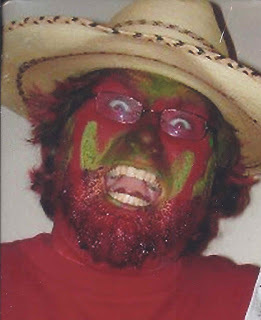
Born and raised in San Antonio, Texas, Nicholas Paschall earned his bachelors degree in History from the University of Texas at San Antonio. He started writing when he was young, but he first started his horror career in 2011 with a short story published in Dark Moon Digest . He's been in many anthologies, including Shadows and Teeth Volume Three, What Dwells Beneath, and the upcoming Nickel Nightmares. His first published novel was the Father of Flesh , but in 2018 he has whole set of novels coming out for his readers to enjoy. In early Spring, he has Bleak Dawn: Hunters of the Dead-Witches War and Travels to Teyuna. He can be found at random conventions, willing to discuss anything you have on your mind. In his personal time, he whittles away the hours of the day writing, editing, and tinkering on his website.
What works/authors have had an impact on you professionally or personally? How?
I'd be lying if I said Stephen King didn't influence me as a writer, as for my generation he was the one to breathe life back into the horror genre. He paved the way with rabid dogs and killer clowns so that we could all enjoy a good zombie story, while others like Anne Rice brought attention to vampires in a way that made the creative minds in the blackest literary circle declare a war against the romantic bloodsucker. I have a fondness for Vonnegut that extends into the surreal, as his work often does, and I like Michael Crichton for his birth of the modern day sci-fi involving dinosaurs and theme parks. As a member of the 90's kids, I'd say that R.L. Stine stirred the pot for us, while Silent Hill and Resident Evil left us afraid to go to sleep at night. There are so many influences and great names to drop that just the few I've mentioned barely manage to scratch the surface.
If you could be a famous person (living or dead) for a day, who would you be and why?
If I were to just be carry-on metal luggage that could observe? I think I'd choose Vlad the Impaler, just to see what was going through his mind when he planned his battles or ordered thousands to their grisly deaths. If I got to take over the person, then I'd say William Shakespeare during the height of his career, just to see what the life of a playwright during the day was like. Maybe see what he was working on and if it was something I recognized.
What is the oldest thing in your fridge and how old is it?
A box of baking soda that I cannot remember buying.
Dessert or no dessert? Why? If dessert, what is your fave?
I remember when I was a kid Olive Garden had a dessert called the Brownie Decadenza. It was a warm brownie (no nuts!) in a margarita glass with vanilla ice cream and hot sauce. They had it for years, and it was my sole reason to eat there whenever we would go out. My parents could order whatever nasty vegetable or exotic food for me and I would happily indulge them, if only to get that treat.
What is your favorite motivational quote?
"This may not serve for long, but long enough is all I need." Something my father used to say when he would repair machines for his business instead of replacing them right off the bat. I use that idea in a lot of ways, as I can move figurative mountains with the shoe-string budget that saying promotes. I'm in the process of fixing up my house just for my own habitation, and have used cheap replacements for doors, doorknobs, and ceiling fans in areas where the only people who see them are my wife and I. Yes, I will have to replace them someday when we plan on moving, but when we do replace them for the showcasing of the house, they'll be brand new and we can promote the house as having recent work done without lying.
Published on January 11, 2018 22:00
January 7, 2018
Am I the Only One Falling Behind?
Between the holidays and basketball for my boys, I feel like I’m falling really far behind. I took the last couple of weeks off from social media to attempt to get caught up, and I’m still behind.
Maybe I’ll never be caught up. Maybe I’ll just live in a perpetual state of needing to get stuff done.
If that’s the case, I guess I should prioritize which things need to be done first. That’s a difficult task. *Sigh* I guess I’ll have to do what I can.
Short post today since I’m so far behind. I’ll try to get caught up for next week, but that may or may not happen.
Happy Monday!
Maybe I’ll never be caught up. Maybe I’ll just live in a perpetual state of needing to get stuff done.
If that’s the case, I guess I should prioritize which things need to be done first. That’s a difficult task. *Sigh* I guess I’ll have to do what I can.
Short post today since I’m so far behind. I’ll try to get caught up for next week, but that may or may not happen.
Happy Monday!
Published on January 07, 2018 22:00
January 4, 2018
Meet An Author Friday: Peter Molnar
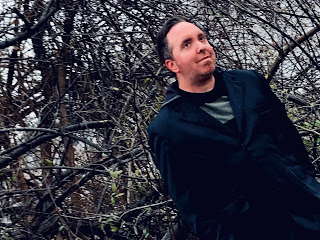
Peter Molnar has been writing genre fiction for over twenty years and he is a member of the Horror Writer’s Association . He is a VIP Author for Stitched Smile Publications as well as a member of its editorial staff. His work has sold to such genre markets as City Slab: Urban Tales of the Grotesque, Necrology Shorts, and most recently Hydrophobia: A Charity Anthology to Benefit Victims of Hurricane Harvey, among others. He works in the Philadelphia secondary school system as an English teacher and Creative Writing Coach.
What works/authors have had an impact on you professionally or personally? How?
-I read "Pet Sematary" by Stephen King for the first time when I was twelve-years old and it scared the hell out of me, to put it mildly. I had been writing since I was eight, little shorts here and there, but it was that book that set me on a path to write horror and suspense. I wanted to scare other readers like that book scared me, and I have been working towards that ever since with everything I write. Julia Cameron's "The Artist's Way" saved me from severe writer's block which set in just after my child was born eighteen years ago. I was trying to balance my artistic life with being a father and could not effectively achieve it. I learned the power of practices like "Morning Journals", "Artist dates" (dates with your inner artist), and "Narrative Timelines", which involves writing about yourlife from earliest memories to the present time. As far as I'm concerned, Julia Cameron saved my life back when I was twenty-four. When an artist can't create, nothing makes sense and the world tilts too far over. Chuck Palahniuk's "Fight Club" taught me how to embrace minimalism as well as dark humor in writing. Philip K. Dick's "A Scanner Darkly" influenced me in terms of embracing the weird and wild in literature, so much so I ended up writing my thesis paper on the novel at Temple University. And Dennis Lehane's "Mystic River" taught me how to construct characters so vivid that you hurt when they hurt and you anguish when they die. Oh, and "Mickey Mouse and the Spooky House", first book I ever read.
If you could be a famous person (living or dead) for a day, who would you be and why?
-I would want to be Jonathan Nolan, brother of Christopher Nolan, and co-creator of HBO's "Westworld". He also co-wrote my favorite movie "The Dark Knight" with his brother. But I would want to be Jonathan back when he was writing the first draft of what I consider to be one of the most ingenious short stories ever written, 'Memento Mori". The story later went on to be made into a movie titled "Memento", directed by (you guessed it!) his brother, also. "Memento Mori" is the type of short story I hold up as the ultimate shining example of a writer at the top of his or her form, and firing on all cylinders. I would want to live out the day Jonathan actually sat down and started to write that short story, so I could sit in and get a feel for where his mind was at when he started crafting this amazing short work of fiction.
What is the oldest thing in your fridge and how old is it?
-Frozen string beans. I feel really bad for frozen vegetables. All too often, they go into the freezer and their buyer had the best intentions for buying them ("I'm going to start eating healthy!!!"), but then those intentions go to pot and the frozen veggies pay the price with freezer burn and abandonment. The age of my frozen string beans? Sometime around the Renaissance Period.
Dessert or no dessert? Why? If dessert, what is your fave?
-I don't know if a frothy espresso counts, but that's what I like after a good meal. I try to stay away from the sweets. I like bold, sour, and highly-caffeinated.
What is your favorite motivational quote?
-In terms of writing: "God, You take care of the quantity, and I will take care of the quality." -Julia Cameron
Published on January 04, 2018 22:00
January 2, 2018
A World of Possibilities in 2018
Since November 2016, my life has been challenging. I lost a job, struggled to find a new job, moved to a new state, and then once again struggled to find a new job and settle in—in addition to tons of minor bumps in the road along the way.
I finally feel like I’m in a place where life is becoming normal again. I’ve even had the energy and time to write. I’m looking forward to 2018 and have several goals I’m hoping to achieve. They are as follows:
Get Edge of Humanity (the sequel to Humanity’s Hope ) out into the worldPublish Undead Ifs, the third book in The Ifs series Get some audiobooks madeWrite another novel (or more, I have several ideas in mind, so with a little luck, maybe I’ll have the chance to work on several stories during the course of the year) I don’t doubt that 2018 will have its share of ups and downs. There will be tough times, and there will be great times—that’s just life. However, through it all, I hope to hang on to my dreams and accomplish some goals. After all, what fun is life if you don’t have dreams?
What are some of your goals for 2018?
I finally feel like I’m in a place where life is becoming normal again. I’ve even had the energy and time to write. I’m looking forward to 2018 and have several goals I’m hoping to achieve. They are as follows:
Get Edge of Humanity (the sequel to Humanity’s Hope ) out into the worldPublish Undead Ifs, the third book in The Ifs series Get some audiobooks madeWrite another novel (or more, I have several ideas in mind, so with a little luck, maybe I’ll have the chance to work on several stories during the course of the year) I don’t doubt that 2018 will have its share of ups and downs. There will be tough times, and there will be great times—that’s just life. However, through it all, I hope to hang on to my dreams and accomplish some goals. After all, what fun is life if you don’t have dreams?
What are some of your goals for 2018?
Published on January 02, 2018 22:00
December 31, 2017
2018 New Year New Reads Blog Hop
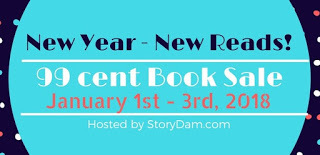
Did you get a gift card for the holidays? Are you looking for something to spend it on? Well look no further! If you're looking for some great reads for a low price, you're in the right place!
For the New Year, Life After the Undead is on sale for 99 cents! Get the ebook now and enjoy some zombie fun!
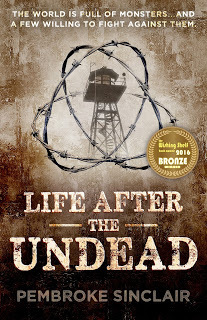
Seventeen-year-old Krista must quickly figure out how she's going to survive in the zombie-destroyed world.
The one advantage humans have is that the zombies hate humid environments, so they're migrating west to escape its deteriorating effects. The survivors plan to construct a wall at North Platte to keep the undead out, and Krista has come to Nebraska to start a new life.
Zombies aren’t the only creatures she has to be cautious of—the other survivors have a dark side. Krista must fight not only to live but also to defend everything she holds dear—her country, her freedom, and ultimately, those she loves.
Join Krista in her quest to survive in this thrilling apocalyptic novel by Pembroke Sinclair.
Published on December 31, 2017 22:00
December 19, 2017
How Do I Know When My Story Is Done?
Like so many questions about writing, this one is difficult to answer. Technically speaking, your story is never really done. There are always ways to change it and improve it. However, at some point, you have to make the decision that the story is good enough. You have to say that you aren’t going to make any more changes.
This can be difficult. It can be hard to know if the story is “good enough.” After all, we are our own worst critics, so we never believe that our work is “good.”
One thing that might help is to have others read your story. Start with an editor (or two) , so you can fix any content or character problems. Then, you’ll need to make sure your grammar and sentence structure are correct. After your story has gone through a few rounds of editing with a professional editor, then you can send it to beta readers.
Beta readers play an incredibly important role in the writing process , and it’s a job that shouldn’t be taken lightly. Like an editor, beta readers give you suggestions on how to improve your story. In most cases, beta readers have not been trained as editors, but as readers, they know what works in a story and what doesn’t.
The goal of your story should be to invoke some type of emotional response in your reader. To do this, they have to understand what your story is about, what emotions you are trying to convey, and react to your characters in either a good or bad way (not all characters have to be likable). If you haven’t accomplished this goal, then you’ve probably failed in your writing attempt. That means you probably need to go back and rework your story.
Editors and beta readers are great resources for helping you achieve your writing goal. They can point out flaws and plot holes, along with ways to improve them. However, keep in mind that everyone who reads your book will bring their own experiences and biases to the work. No two people will react to it the same way—and that can further complicate if you view your story as finished or not.
Every reader is unique, and even if readers aren’t reacting the same way to your story, if they are still reacting, you’ve probably accomplished your goal. Some will love it, and some will hate it, but as long as they aren’t saying, “Huh? I don’t get it,” then you’re on the right track. (Side note: there still may be a few readers who are confused by your story, but as long as the majority of them aren’t having this issues, you’ll be just fine!)
In the end, no matter what an editor or a beta reader says, you are still the creator of the story, you get final say in what gets changed and what doesn’t. Editors and beta readers will have different ideas of how a scene should play out or about a character’s personality, but you get to make the final determination if you take their suggestions or not.
Writing is both a simple and complicated process. There are rules, but there aren’t any rules. When it comes to creating, most of the time you have to follow your heart and your head to determine when the story is done.
This can be difficult. It can be hard to know if the story is “good enough.” After all, we are our own worst critics, so we never believe that our work is “good.”
One thing that might help is to have others read your story. Start with an editor (or two) , so you can fix any content or character problems. Then, you’ll need to make sure your grammar and sentence structure are correct. After your story has gone through a few rounds of editing with a professional editor, then you can send it to beta readers.
Beta readers play an incredibly important role in the writing process , and it’s a job that shouldn’t be taken lightly. Like an editor, beta readers give you suggestions on how to improve your story. In most cases, beta readers have not been trained as editors, but as readers, they know what works in a story and what doesn’t.
The goal of your story should be to invoke some type of emotional response in your reader. To do this, they have to understand what your story is about, what emotions you are trying to convey, and react to your characters in either a good or bad way (not all characters have to be likable). If you haven’t accomplished this goal, then you’ve probably failed in your writing attempt. That means you probably need to go back and rework your story.
Editors and beta readers are great resources for helping you achieve your writing goal. They can point out flaws and plot holes, along with ways to improve them. However, keep in mind that everyone who reads your book will bring their own experiences and biases to the work. No two people will react to it the same way—and that can further complicate if you view your story as finished or not.
Every reader is unique, and even if readers aren’t reacting the same way to your story, if they are still reacting, you’ve probably accomplished your goal. Some will love it, and some will hate it, but as long as they aren’t saying, “Huh? I don’t get it,” then you’re on the right track. (Side note: there still may be a few readers who are confused by your story, but as long as the majority of them aren’t having this issues, you’ll be just fine!)
In the end, no matter what an editor or a beta reader says, you are still the creator of the story, you get final say in what gets changed and what doesn’t. Editors and beta readers will have different ideas of how a scene should play out or about a character’s personality, but you get to make the final determination if you take their suggestions or not.
Writing is both a simple and complicated process. There are rules, but there aren’t any rules. When it comes to creating, most of the time you have to follow your heart and your head to determine when the story is done.
Published on December 19, 2017 22:00
December 17, 2017
What Are Some of Your Best Things?
With the end of the year upon us, now is the time to look back at the year and review the good and the bad. Hopefully, you’ll focus more on the good than the bad. While both of them have influenced your life, it’s best to focus on the positive.
I’d like to know: what are some of the best things that have happened to you this year?
They don’t have to be major, they can be small things. Sometimes getting out of bed and showering is a victory. Other times, getting a new job or publishing a book can be great accomplishments. What are some of yours?
I’m also curious to know what you’re looking forward to in 2018. Again, it doesn’t have to be major, just share something positive.
Let’s send 2017 out on a positive note and bring in 2018 with optimism and hope!
I’d like to know: what are some of the best things that have happened to you this year?
They don’t have to be major, they can be small things. Sometimes getting out of bed and showering is a victory. Other times, getting a new job or publishing a book can be great accomplishments. What are some of yours?
I’m also curious to know what you’re looking forward to in 2018. Again, it doesn’t have to be major, just share something positive.
Let’s send 2017 out on a positive note and bring in 2018 with optimism and hope!
Published on December 17, 2017 22:00
December 12, 2017
I Seriously Don’t Handle Medical Emergencies Well
In the past, I’ve talked about how super well I handle
medical emergencies for my kids
, but when it comes to my pets, I’m just as special. Over the weekend, I was reminded how I have a hard time dealing with medical emergencies.
I blame the vast majority of my coping issues on my anxiety. When something happens, adrenaline instantly shoots through my body (as I’m sure it does for everyone), but that is then followed by a slideshow of worst-case scenarios that play through my brain. Every horrible, life-changing and threatening idea crosses my mind, which, as you can imagine, increases my stress and worry.
Past experiences also influence how I react to current emergencies. Some of you may recall the incident that occurred with the first corgi I ever owned . Since then, I’m convinced that any little thing that happens to my dogs will have deadly consequences. The vet in Laramie was used to and incredibly patient and caring when I called numerous times to ask questions, and the vet here in Nebraska has just had their first taste of my neurosis.
On Saturday, both of the corgis (Floki and Siggy) went to the vet for their yearly vaccinations. It was our first trip there since moving, and I was incredibly impressed by the facilities and the doctor. She was incredibly kind and helpful. We left with no issues.
 There will be plenty of pictures of Floki, but here’s one of Siggy hangin’ on the couch.
There will be plenty of pictures of Floki, but here’s one of Siggy hangin’ on the couch.
Later that evening, I was working on my computer while the dogs played in my office. At one point, Floki was laying on his back on the bed panting. I asked him if he was hot, and he just looked at me with his big brown eyes. A few moments later, he moved to lay near the wall, and that’s when I noticed the swelling around his eyes.
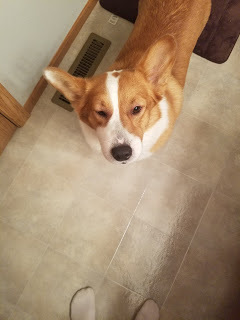 You can kind of tell from this picture that he’s puffier than normal.
You can kind of tell from this picture that he’s puffier than normal.
My heart leaped into my throat and I immediately looked up the vet’s number on the internet (it’s saved in my phone now). I could tell that it was an allergic reaction, and the first thing that ran through my mind was that he was going to swell up and asphyxiate. I had to get him to the vet as soon as possible.
Since it was a Saturday night, the answering service picked up. It explained that it was an emergency answering service only and that they couldn’t take general questions or regular appointments. It took f-o-r-e-v-e-r to get through the message, and I was sure my dog was going to go into convulsions before I could talk to anyone. Finally, I was told that if I wanted to proceed I needed to hit #1—which I did.
I did my best to speak slowly and coherently and not forget to leave my number. I then held the phone next to my chest and waited for the doctor to call back. I realized that standing like that was only going to add to my anxiety, so I tried to busy myself with other tasks so I didn’t go insane. I started to fold laundry, mumbling under my breath the entire time that the vet needed to call me back.
She did. Probably within 10 minutes of sending the message.
I told her what was going on, and she said that it probably wasn’t the vaccinations that caused the reaction but could possibly have been a spider bite. She asked if I had Benadryl in the house, and I went on a search. Of course, I didn’t, so I rushed to the store.
Another super fun fact about me is that it makes me anxious to take and distribute medicine. Even after the vet gave me instructions—that I wrote down—on how much Benadryl to give Floki, I checked it about 100 times, then still felt uncomfortable about giving him meds—even though I knew he needed them!
I contemplated giving him a half dose or a kid’s dose, then I told myself that the vet met Floki earlier that day, she knew how much he weighed, and she was the doctor, so I gave him the amount she told me to give him.
On the plus side, aside from being puffy, Floki never acted any different than normal. He was still his sweet, curious self. He shook his head a little more often, but he didn’t yip or just lay down. Even after giving him Benadryl, he stayed the same lovable corgi.
That, as you can imagine, made me feel better, but it took a long time for the swelling to go down. That made me worry that maybe he had been bitten by a black widow or a brown recluse, so I was asking my spouse what he thought. He reassured me that if the spider that had bitten Floki was poisonous, we would know. The poor baby would be in a ton of pain or his flesh would be rotting off his face. Surprisingly, hearing that helped a bit, even though it didn’t completely eradicate my worry.
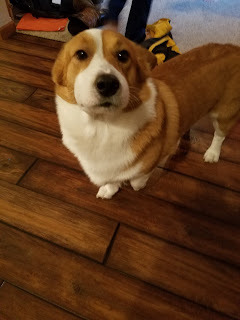 This was later in the night after some Benadryl. His muzzle is still puffy, but he was doing a lot better.
This was later in the night after some Benadryl. His muzzle is still puffy, but he was doing a lot better.
By the next day, the swelling had gone down significantly. Yes, I awoke a couple of times during the night to check on my fur baby, but he was fine. He continued to improve, and by now, the swelling is completely gone and I’m sure Floki doesn’t remember anything that happened. I, on the other hand, will continue to have anxiety issues when it comes to medical emergencies.
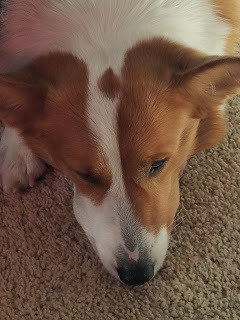 The fur baby just hanging out and chilling.
The fur baby just hanging out and chilling.
I blame the vast majority of my coping issues on my anxiety. When something happens, adrenaline instantly shoots through my body (as I’m sure it does for everyone), but that is then followed by a slideshow of worst-case scenarios that play through my brain. Every horrible, life-changing and threatening idea crosses my mind, which, as you can imagine, increases my stress and worry.
Past experiences also influence how I react to current emergencies. Some of you may recall the incident that occurred with the first corgi I ever owned . Since then, I’m convinced that any little thing that happens to my dogs will have deadly consequences. The vet in Laramie was used to and incredibly patient and caring when I called numerous times to ask questions, and the vet here in Nebraska has just had their first taste of my neurosis.
On Saturday, both of the corgis (Floki and Siggy) went to the vet for their yearly vaccinations. It was our first trip there since moving, and I was incredibly impressed by the facilities and the doctor. She was incredibly kind and helpful. We left with no issues.
 There will be plenty of pictures of Floki, but here’s one of Siggy hangin’ on the couch.
There will be plenty of pictures of Floki, but here’s one of Siggy hangin’ on the couch.Later that evening, I was working on my computer while the dogs played in my office. At one point, Floki was laying on his back on the bed panting. I asked him if he was hot, and he just looked at me with his big brown eyes. A few moments later, he moved to lay near the wall, and that’s when I noticed the swelling around his eyes.
 You can kind of tell from this picture that he’s puffier than normal.
You can kind of tell from this picture that he’s puffier than normal.My heart leaped into my throat and I immediately looked up the vet’s number on the internet (it’s saved in my phone now). I could tell that it was an allergic reaction, and the first thing that ran through my mind was that he was going to swell up and asphyxiate. I had to get him to the vet as soon as possible.
Since it was a Saturday night, the answering service picked up. It explained that it was an emergency answering service only and that they couldn’t take general questions or regular appointments. It took f-o-r-e-v-e-r to get through the message, and I was sure my dog was going to go into convulsions before I could talk to anyone. Finally, I was told that if I wanted to proceed I needed to hit #1—which I did.
I did my best to speak slowly and coherently and not forget to leave my number. I then held the phone next to my chest and waited for the doctor to call back. I realized that standing like that was only going to add to my anxiety, so I tried to busy myself with other tasks so I didn’t go insane. I started to fold laundry, mumbling under my breath the entire time that the vet needed to call me back.
She did. Probably within 10 minutes of sending the message.
I told her what was going on, and she said that it probably wasn’t the vaccinations that caused the reaction but could possibly have been a spider bite. She asked if I had Benadryl in the house, and I went on a search. Of course, I didn’t, so I rushed to the store.
Another super fun fact about me is that it makes me anxious to take and distribute medicine. Even after the vet gave me instructions—that I wrote down—on how much Benadryl to give Floki, I checked it about 100 times, then still felt uncomfortable about giving him meds—even though I knew he needed them!
I contemplated giving him a half dose or a kid’s dose, then I told myself that the vet met Floki earlier that day, she knew how much he weighed, and she was the doctor, so I gave him the amount she told me to give him.
On the plus side, aside from being puffy, Floki never acted any different than normal. He was still his sweet, curious self. He shook his head a little more often, but he didn’t yip or just lay down. Even after giving him Benadryl, he stayed the same lovable corgi.
That, as you can imagine, made me feel better, but it took a long time for the swelling to go down. That made me worry that maybe he had been bitten by a black widow or a brown recluse, so I was asking my spouse what he thought. He reassured me that if the spider that had bitten Floki was poisonous, we would know. The poor baby would be in a ton of pain or his flesh would be rotting off his face. Surprisingly, hearing that helped a bit, even though it didn’t completely eradicate my worry.
 This was later in the night after some Benadryl. His muzzle is still puffy, but he was doing a lot better.
This was later in the night after some Benadryl. His muzzle is still puffy, but he was doing a lot better.By the next day, the swelling had gone down significantly. Yes, I awoke a couple of times during the night to check on my fur baby, but he was fine. He continued to improve, and by now, the swelling is completely gone and I’m sure Floki doesn’t remember anything that happened. I, on the other hand, will continue to have anxiety issues when it comes to medical emergencies.
 The fur baby just hanging out and chilling.
The fur baby just hanging out and chilling.
Published on December 12, 2017 22:00



